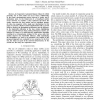Free Online Productivity Tools
i2Speak
i2Symbol
i2OCR
iTex2Img
iWeb2Print
iWeb2Shot
i2Type
iPdf2Split
iPdf2Merge
i2Bopomofo
i2Arabic
i2Style
i2Image
i2PDF
iLatex2Rtf
Sci2ools
ICC
2009
IEEE
2009
IEEE
Performance Evaluation of Multiple-Relay Cooperative ARQ Strategies for Mobile Networks
In Cooperative Automatic Repeat reQuest (C-ARQ) protocols, one or more nodes can act as relays, collaborating in the frame retransmission process between a sender and a destination node. In the framework of a broadband mobile access network, we consider a relay enhanced cell where the sender represents the base station, and an undefined number of relays can cooperate with a single user (destination). In this paper we present a Markov model complemented with a reward model to analyze the throughput performance and the efficiency in the bandwidth utilization at the base station, highlighting a clear tradeoff between them. Both performance metrics are balanced by means of a multi-objective optimization algorithm resulting in a retransmission strategy for the access node that notably improves the bandwidth efficiency while maintaining the throughput very close to its maximum. The benefits of the proposed approach are evaluated in two scenarios. In the first one, the relays are part of the ...
| Added | 18 Feb 2011 |
| Updated | 18 Feb 2011 |
| Type | Journal |
| Year | 2009 |
| Where | ICC |
| Authors | Juan J. Alcaraz, Joan García-Haro |
Comments (0)

